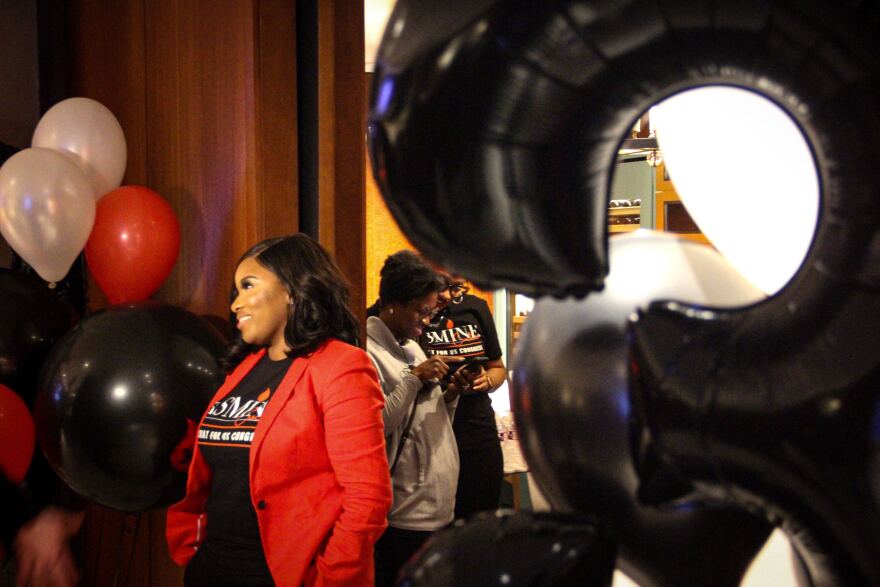Another takeaway? In a primary election, where turnout is seldom anything but anemic, motivated voters can have an inordinate influence on the outcome.
A relatively small cadre of voters nominated a notably more partisan group of elected officials in contentious primaries across North Texas. And that has contributed to the few surprises in North Texas primary elections.
While turnout is typically much lower in primaries than in general elections, Republican turnout in North Texas and across the state outpaced Democratic turnout.
The voters who showed up generally picked more partisan contenders, especially in Republican primaries. Trump-supported candidates in Tarrant County dominated GOP primaries. And one of the state’s most conservative lawmakers now faces a runoff after voting to investigate the Jan. 6 insurrection.
Democrats chose a mix of progressive and moderate candidates to run on their behalf.

Primaries in midterm elections tend to make poor bellwethers for mainstream political sentiment. In addition to being generally low-turnout affairs, the intra-party battles usually involve insufficient money to grab the attention of most voters. They typically attract only the most ardently committed partisans, with the less engaged and less politically orthodox majority of voters staying home.
But in an era of rising partisanship and in light of Texas political maps that practically eliminate swing districts, few upsets are expected in the general election. Come November, districts that tilt Republican are likely to elect the Republican who won the primary, and vice versa for Democrats.
That means the minority of voters who showed up for the primary have the greatest chance to influence who will represent their communities.
Here are highlights from races across the region:
County judges
In Tarrant County, the Republican competition to replace retiring county judge Glen Whitley turned into a particularly bruising slugfest over the direction of the county’s GO
Throughout the campaign, culture war issues took center stage, with both candidates vying to appeal to Republican base voters uncomfortable with efforts to achieve racial justice.
Betsy Price, Fort Worth’s longest-serving mayor who stepped down last year, drew fire from Southlake lawyer Tim O’Hare, who worked to brand her as insufficiently conservative. Price, a business-oriented Republican, slammed O’Hare as a liar willing to say anything to get elected.

In the end, O’Hare won the race handily, taking 57% of the vote to Price’s 34%. The three other GOP candidates — Byron Bradford, Robert Trevor Buker and Kristen Collins — won the remainder.
As the results came in on Tuesday, Price said she was surprised that voters believed the “lies” and “mudslinging” from O’Hare.
“I thought they knew me better than that,” she said.
Endorsed by former President Donald Trump and Sen. Ted Cruz, O’Hare leaned on his track record as a far-right activist and politician. An architect of the Southlake political action committee that set off an early and high-profile battle over what he incorrectly terms “critical race theory,” he’s long targeted minority groups.
As Farmers Branch mayor, his push to make life the city inhospitable for his undocumented neighbors was eventually ruled unconstitutional, after a protracted legal battle that cost the city an estimated $6.6 million in legal fees.
O’Hare told reporters that Democrats use race to “pit people against each other” after pledging to continue combating critical race theory if he won in November.
"I think people in general, Tarrant County and across the state and the country, are sick of all this racial division,” he said.
In November, O’Hare will face former Tarrant County Democratic Party Chair Deborah Peoples. Peoples, a retired AT&T vice president, won 83% of the vote, beating former Arlington City Council member Marvin Sutton.
The county long been led by Republicans, but in recent elections has narrowly favored Democrats in marquee races. Beto O’Rourke won the county in his 2018 Senate bid, and the county’s voters preferred President Joe Biden in the 2020 over Trump.

Across Texas, the pandemic forced the typically obscure county judge into the limelight. These top county-level elected officials are granted expansive powers during times of emergency, becoming lightning rods for their decisions about mask mandates, business closures and other responses to the coronavirus.
In Dallas County, the GOP primary for county judge turned on similar ideological divisions. Lauren Davis, a co-founder of The Gent’s Place barbershop chain, centered her opposition to COVID-19 restrictions in the county and won the primary.
She beat Edwin Flores, a former Dallas school board member widely seen as more moderate and more electable in the Democrat-heavy county.
Davis will face incumbent Clay Jenkins, who handily fended off a challenger in the Democratic primary.
Congress
North of Dallas, in Texas’ 3rd Congressional District, Rep. Van Taylor of Plano is heading to a runoff after challengers questioned his right-wing credentials. The district stretches from McKinney to Commerce, and includes most of Collin County and all of Hunt County.

Specifically, the two-term congressperson drew four primary challengers after he voted first to certify the 2020 presidential election results, and then to set up an independent commission to investigate the Jan. 6 riot at the U.S. Capitol that led to several deaths, dozens of injured police and $1.5 million in property damage.
Taylor will face Keith Self in the May 24 runoff. The former Collin County Judge told KERA that "voters want to restore integrity to this district.”
Taylor won 49% of the vote, falling short of about 800 votes short of the majority he needed to win outright. Self won 26%.
Taylor has long been considered one of the most right-wing lawmakers in Texas, earning endorsements from groups like the NRA, National Right to Life and Americans for Prosperity. He out-fundraised Self by a factor of 10.
Yet none of that appears sufficient to beat back the angst of those Republican voters still hyper-focused on Donald Trump and his lies about the election he lost.
In the southern Dallas 30th congressional district, a nine-way race to replace outgoing Democratic stalwart Eddie Bernice Johnson has also ended in a runoff.

State House Rep. Jasmine Crockett fell just short of winning enough votes in the Democratic primary to avoid a runoff in her bid to succeed U.S. Rep. Eddie Bernice Johnson. That was despite an endorsement by Johnson, who had represented the 30th district since 1992.
Jane Hope Hamilton, a former staffer for Rep. Marc Veasey of Fort Worth, came in second in the vote count.
A runoff election will also determine the Republican nominee in that district, which is tilted heavily in favor of Democrats. Six Republicans ran for the nomination in the district; James Harris and James Rodgers head to the runoff.
Across the rest of North Texas, incumbents in both parties appear to be the biggest winners. Sitting members of Congress from across the region handily beat primary challenges, if they faced a challenge at all.
With new political maps drawn to eliminate the possibility of flipping seats from one party to another in most cases, those incumbents are widely expected to sail through the general election in November with relative ease.
District attorneys
Tarrant County District Attorney Sharen Wilson’s decision not to run for reelection left a wide-open field for three Republicans and three Democrats who wanted to become her successor.
Tarrant County Criminal Court No. 10 Judge Phil Sorrells is headed to a runoff in the Republican primary. He’s been a judge for 25 years and served as an assistant district attorney for many years before that. Sorrells got an endorsement from former President Donald Trump and several conservative organizations. He'll face State Rep. Matt Krause, who dropped out of the race for Texas attorney general and entered the race for Tarrant County DA in November. That was not long after he had informed the Texas Education Agency that he wanted school districts to report whether they had any of the more than 800 book titles he included in a 16-page list. Krause did not elaborate on how or why he’d chosen those titles, although many dealt with issues of race or sexuality.
Sorrells got about 40 percent of the Republican primary vote and Krause got 31 percent. 371st District Court Judge Molly Westfall, who also had a long career as an assistant district attorney in Tarrant County, came in third.
Tiffany Burks, a longtime Tarrant County prosecutor, won the Democratic primary, prevailing over Albert John Roberts and Lawrence Meyers. Roberts has experience as a prosecutor in Dallas and Tarrant counties and had unsuccessfully challenged Wilson in the 2018 district attorney race. Running on a progressive platform, Roberts drew support from national criminal justice reform groups. Meyers is a former Texas Court of Criminal Appeals judge who left the Republican Party and became a Democrat, and then lost his reelection bid in 2016 to his Republican challenger.

In Dallas County, the Democratic primary race for district attorney was déjà vu all over again — the same candidates who ran against each other in 2018 faced off again. Dallas County District John Creuzot had beat out former judge Elizabeth Frizzell by only 589 votes in 2018. This year, he won the primary again but with more comfortable lead — almost 60% of the votes.
Creuzot will run against Republican and former DA Faith Johnson in November — and that will be a rematch as well. Creuzot defeated Johnson in the 2018 general election.
Texas Senate
One of the few incumbents facing stiff odds because of the new legislative maps is Texas Sen. Beverly Powell. The Burleson Democrat beat Republican Konni Burton in Senate District 10 in 2018, flipping the seat from red to blue.
Powell faced no challenger in this year’s Democratic primary, but two Republicans — Arlington lawyer Warren Norred and Texas Rep. Phil King — drew in big names and big money as they fought for the chance to take her on.
King won handily, taking 76% of the vote.
When Powell won election in 2018, the district was one the state’s few swing districts. It was contained entirely within mostly suburban Tarrant County.
After the state’s political districts were reconfigured last year, Senate District 10 was heavily tilted in favor of Republicans. Now, it sprawls across nearly 200 miles, end to end, and includes part or all of eight counties: Brown, Callahan, Johnson, Palo Pinto, Parker Shackleford, Stephens and Tarrant.

Democrats challenged the new district boundaries in court, arguing that the new state Senate map splits Black and Latino voting blocs, reducing their voting power and turning a racially mixed district into a majority-white district. The challenge has so far been unsuccessful but a trial is expected in the case later this year.
If the reconfigured maps stay in place, Powell is unlikely to hold onto the seat when she faces King this fall.
Got a tip? Christopher Connelly is KERA's One Crisis Away Reporter, exploring life on the financial edge. Email Christopher at cconnelly@kera.org .You can follow Christopher on Twitter @hithisischris.
KERA News is made possible through the generosity of our members. If you find this reporting valuable, consider making a tax-deductible gift today. Thank you.






